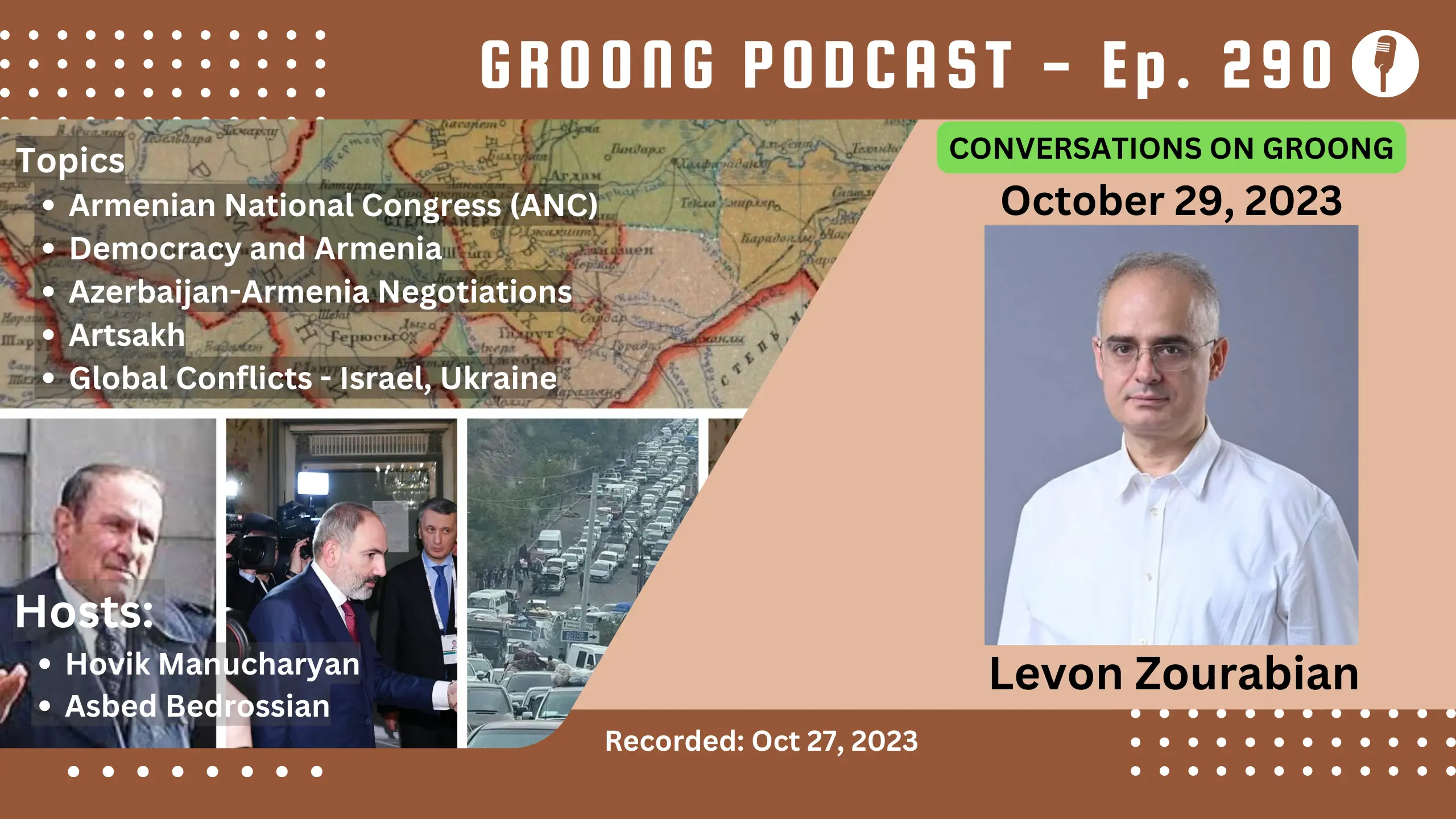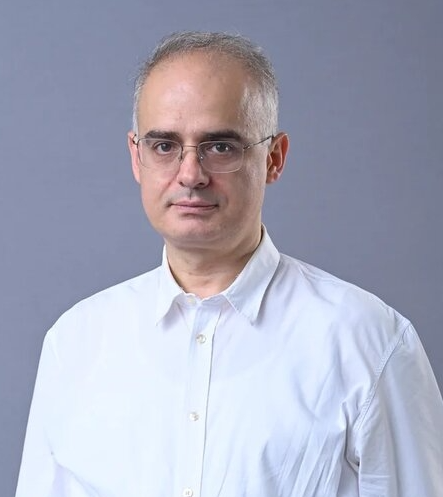
Groong Links:
Guest:
Topics:
- Armenian National Congress (ANC)
- Democracy and Armenia
- Azerbaijan-Armenia Negotiations
- Artsakh
- Global Conflicts - Israel, Ukraine
Episode 290 | Recorded: October 27, 2023
Show Notes
Armenian National Congress
Mr Zourabian, You are the Vice President of the Armenian National Congress (ANC) Հայ Ազգային Կոնգրես (ՀԱԿ) party.
Question:
- What does the ANC stand for today? What are its philosophies, ideologies and goals?
As a young journalist Nikol Pashinyan was allied with the Armenian National Movement (HHSh) circles. As a beginning politician, Pashinyan was a member of the ANC alliance in parliament. Despite parting ways with your political force and forming the “Yelk Alliance,” Pashinyan always had a reputation as a “disciple” of Levon Ter-Petrosyan. Ter-Petrosyan was seen as Pahsinyan’s ideological mentor.
Questions:
- Did the ANC endorse Pashinyan in 2018, and if so, with what expectations?
- At what point did the ANC stop being on board with Pashinyan’s policies and direction?
Democracy and Armenia
Since the government system changed to a parliamentary style, the Armenian citizen no longer elects many of its representatives, from mayors to prime ministers, and so on. And since 2019, the country has been a single party supermajority ruled country. While this supermajority remains in power, there is no way to get anything done that the ruling party doesn’t want, and the opposition can’t stop anything that the ruling party puts in motion.
Opposition groups say that there are over 3 dozen political prisoners in Armenia today. After the 2021 elections, many non-ruling party election winners were harassed, slapped with alleged corruption lawsuits, jailed, or forced into power-sharing compromises, and so on. Yet Pashinyan continues to use the term “democracy” as a symbol of his rule. In his recent 44-minute speech in Strasburg, he mentioned the term democracy 22 times.
Questions:
- In your view, is Armenia today a democratic state?
- How would you assess Pashinyan’s term in office since 2018?
- How is it that Pashinyan has failed at almost everything during his term, including catastrophic war losses, yet remains at the head of the government?
Ter-Petrosyan’s argument for not getting involved in the calls for regime change (post-2020) seems to have been that our fate is settled. We should work with Nikol to force him to do the right thing.
Questions:
- Is this a correct interpretation of LTP’s position?
- With hindsight, would you say that we could’ve had a better off with anyone else than Nikol in power? In other words, was LTP’s abstinence from regime change a mistake?
Azerbaijan - Armenia Negotiations
With the depopulation of Artsakh and the forced dispossession of its people, the agreement of Nov. 2020 is all but obsolete. Aliyev has not honored any of his commitments in that agreement; for example, Armenian POWs remain in Baku; the Azeri forces have invaded far beyond the Nov 10 line of contact; Azerbaijan did not keep the Lachin corridor open, etc.; and now there is no Armenian population left to protect for the Russians, and the Russians did not protect the line of contact; we can say that because there were constant shootings and atrocities causing fatalities among Armenian civilians and defense forces since the Statement of November 2020.
Question:
- Is there any reason why Armenia should remain a signatory to this agreement?
Many unexplainable things have happened since the agreement was signed: the surrender of Lachin & Karvajar regions, the unilateral handing over of mine maps; the unilateral surrender of the Goris-Kapan highway, the complete non-reaction to the invasions of Armenia-proper in May 2021, September 2021, September 2022, and on and on.
Questions:
- Were there unrecorded, verbal agreements by Pashinyan that were not publicly disclosed?
- Given the current situation, do you think we’re on the brink of another war, in Armenia this time?
Artsakh
We’re all aware of the loss of Artsakh last month, and the dispossession of its people from their homeland of millenia. Over 101,000 people were forcibly evicted in two week’s time at the end of September 2023. And over 45,000 people had already fled after the 44-day war in 2020.
Questions:
- In a recent interview to news.am, you called Nikol Pashinyan the chief party responsible for the depopulation and loss of Artsakh. Can you elaborate on that?
- What are the next steps for the Artsakh leadership?
- President Samvel Shahramanyan, speaker of parliament Davit Ishkanyan and others, and over 100 thousand refugees are in difficult conditions in Armenia right now.
- Should they seek their right of return? Compensation?
- Why does Pashinyan refuse to meet with them and formulate next steps together?
Geopolitical Orientation
Ever since Pashinyan came to power, there has been speculation that his policy has been to move Armenia from the Russian sphere of influence. At times, it became really confusing to understand where Armenia was going in its relationship with Russia.
After the war, and especially after the various Azerbaijani invasions into Armenia proper, Pashinyan’s public criticism of Russian policy became more strident. Most recently, in an interview with Armenian Public TV, he stated that Armenia is not trying to change its geopolitical vector. Yet the following day in Strasbourg, at the PACE assembly he criticized Russia for leaving Armenia alone against its enemies. Yesterday in an interview with the WSJ, he said that he doesn’t see an advantage for Russian bases to remain in Armenia.
Questions:
- What is Pashinyan’s ultimate policy as it relates to external geopolitical orientation?
- How realistic is the idea that the West can replace Russia as a strategic ally of Armenia?
Global Conflicts
Israel - Palestine
Earlier this month Hamas instigated a fresh round of violence in Israel, which responded disproportionately and now there are thousands dead and injured. More importantly, this conflict is another proxy war in the installation of the incoming world order, which evolves from a post-soviet unipolar world, to a post post-soviet multipolar status.
This conflict has repercussions all the way back to the South Caucasus, because our various neighbors have different relationships with Israel and the Palestinians. Azerbaijan is an ally of Israel, Iran is an enemy of Israel and a staunch supporter of Palestinian rights, and Turkey is a two-faced player of all sides.
Questions:
- What dangers and opportunities do you see for Armenia in this conflict?
- How should Armenia navigate through it?
- What tools do we have in FP that we are not using?
War in Ukraine
While Israel-Hamas is the latest flare-up, the greater and longer-term issues in the global geopolitical rearrangement is still playing out in Ukraine, which is the battleground for a Russia vs. NATO war.
Questions:
- What is your analysis of this war in Ukraine? What is your outlook?
- What scenarios arise if Russia “wins”? Can Russia lose?
- What dangers and opportunities do you see for Armenia in this conflict?
- How should Armenia navigate through it?
Wrap-up
All right, that’s our show, we hope you found it useful. Please find us on Social Media and follow us everywhere you get your Armenian news, the links are in the show notes. Thanks to Laura Osborn for the music on our podcasts. We’ll talk to you soon!
Guests

Levon Zourabian
Levon Zourabian is the Vice-President of the Armenian National Congress (ANC) party of Armenia, which is led by the first president of Armenia, Levon Ter-Petrosyan who was in office from 1991-1998. He worked in the presidential administration as Aide and Chief Spokesman to the President. In 1998-2000 Mr. Zourabian studied at Columbia University and has a Master of International Affairs from the School of International and Public Affairs. From 2012-2017 Mr. Zourabian led the parliamentary faction of the ANC in the National Assembly of Armenia. Trained and having researched as theoretical physicist in Yerevan Physics Institute, he also makes appearances as Tech Advocate for the ANC.
Hosts

Asbed Bedrossian
Asbed Bedrossian is an IT professional, and for years oversaw the central IT enterprise infrastructure and services at USC. His decades of experience spanned across IT strategy, enterprise architecture, infrastructure, cybersecurity, enterprise applications, data center operations, high performance computing, ITSM, ITPM, and more.
Asbed founded the Armenian News Network Groong circa 1989/1990, and co-founded the ANN/Groong podcast in 2020.

Hovik Manucharyan
Hovik Manucharyan is an information security engineer who moved from Seattle to Armenia in 2022. He co-founded the ANN/Groong podcast in 2020 and has been a contributor to Groong News since the late 1990s.
Disclaimer: The views expressed by Hovik Manucharyan on the ANN/Groong podcast are his own and do not necessarily reflect the opinions of his employer or any other organization.